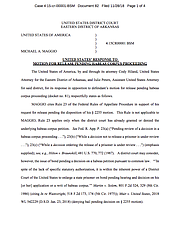The U.S. attorney's office told a federal court Wednesday that it opposed former Circuit Judge Michael Maggio's motion to be released from prison while he tries to get his bribery conviction overturned.
"Release on bail is not favored in § 2255 proceedings, and is rarely granted, because it supplies the sought-after remedy before the merits of the motion are determined," Assistant U.S. Attorney Julie Peters wrote on behalf of U.S. Attorney Cody Hiland in a court document.
Such proceedings are those in which a person already in custody tries to persuade a judge to correct or set aside a sentence that the defendant argues was unlawful or unconstitutional.
Maggio, 57, filed a writ of habeas corpus petition in October seeking to appear before a judge to argue that he was being unconstitutionally imprisoned. Maggio alleged that his original attorney, Lauren Hoover, provided ineffective counsel by misleading him, withholding information from him and pressuring him to plead guilty to bribery in 2015.
Hoover has declined comment.
Maggio acted as his own attorney in that petition, but more recently another of his former attorneys, James Hensley Jr., represented him and urged the court to release Maggio while the petition is under review.
Maggio said he is willing to post bail and is "a model inmate" at Big Sandy U.S. Penitentiary in Kentucky.
Maggio was a judge in Arkansas' 20th Judicial Circuit, which covers Faulkner, Van Buren and Searcy counties.
The prosecution's response said a federal rule cited in Maggio's release motion "is not applicable to Maggio" because it "applies only when the district court has already granted or denied the underlying habeas corpus petition."
While common law would allow a release on bail before such a petition is decided, the prosecutor said, the inmate "must show a substantial federal constitutional claim that 'presents not merely a clear case on the law, but a clear, and readily evident, case on the facts,'" Peters wrote, citing case law.
Further, the defendant "must demonstrate 'some circumstance making the request exceptional and deserving of special treatment in the interests of justice,'" she added. "Maggio's release motion fails to identify a specific 'substantial constitutional issue.'"
Peters said Maggio's release motion contains two legal questions, "and neither one is complex, much less a 'substantial constitutional issue,'" Peters wrote.
First, she said, Maggio attacks the federal bribery law under which he pleaded guilty -- an issue she noted that the 8th U.S. Circuit Court of Appeals has already rejected on appeal.
Second, she argued, "there is nothing 'exceptional and deserving of special treatment' about a defendant making an ineffective assistance claim ... just as 'there is nothing unusual about a claim of unlawful confinement in a habeas proceeding.'"
In his plea agreement, Maggio admitted lowering a Faulkner County jury's judgment in a negligence lawsuit from $5.2 million to $1 million in exchange for thousands of dollars in indirect campaign donations.
The lawsuit was filed over the 2008 death of Martha Bull, 76, of Perryville at a Greenbrier nursing home owned by Fort Smith businessman Michael Morton. On July 8, 2013, Morton signed off on thousands of dollars in donations to several political action committees. On July 10, 2013, Maggio slashed the judgment.
Morton has said he intended for the PAC donations to go in turn to Maggio's campaign for a seat on the Arkansas Court of Appeals, and some did. Maggio later withdrew from that race.
Morton and another person implicated by Maggio in the plea agreement -- former state Sen. Gilbert Baker, R-Conway -- have denied wrongdoing and have not been charged with a crime. The agreement did not identify Morton or Baker by name.
Maggio unsuccessfully sought to withdraw his guilty plea before he was sentenced to 10 years in prison.
State Desk on 11/29/2018
